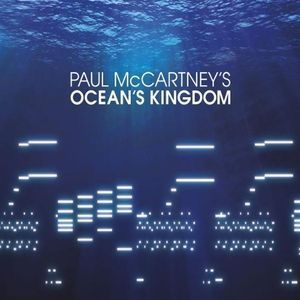Alex Ross's Blog, page 218
September 21, 2011
Nightafternight playlist for summer's end
— Björk, Biophilia (Nonesuch, Oct. 11)
— Ives, Violin Sonatas; Hilary Hahn, Valentina Lisitsa (DG, Oct. 11)
— Wagner excerpts; René Pape, Daniel Barenboim conducting the Staatskapelle Berlin (DG)
— Steve Mackey, It Is Time ; So Percussion (Cantaloupe)
— Chou Wen-chung, Quartets Nos. 1 and 2; Brentano Quartet (Mode)
— Schubert, Winterreise; Christoph Prégardien, Tilman Hoppstock (guitar) (Christophorus)
— Beautiful Mechanical: works of Son Lux, Annie Clark, Shara Worden, Sarah Kirkland Snider, Judd Greenstein, Gabriel Kahane; yMusic (New Amsterdam)
— Notable Women : works of Lera Auerbach, Stacy Garrop, Laura Elise Schwendinger, Joan Tower, Augusta Read Thomas; Lincoln Trio (Cedille)
— Gabriel Kahane, Where Are the Arms (2nd Story Sound)
September 20, 2011
Reviews in brief: Paul McCartney
McCartney, Ocean's Kingdom; John Wilson conducting the London Classical Orchestra (Hear Music / MPL / Telarc).
He's not getting better.
The live and the dead
The current issue of The Threepenny Review has a lively "Symposium on Live Music," with contributions from Mark Morris, Geoff Dyer, Sarah Rothenberg, Ethan Iverson (playing with The Bad Plus at City Winery tonight), and others. Here's an excerpt from Morris:
There's no shortage of music composed on a computer and brought to market in electronic form. We like it and need it. The sophistication of the sound studio and its ability to apply layer upon layer of sound/music is exciting and important. Musical perfection is within reach! ("Earth to Glenn Gould!") Musical perfection is also a living Hell. In the movie version, Computer Generated Images that rival reality have become so perfectly symmetrical that they give people the creeps. Toy Story scared the shit out of me and I found Avatar dead and cold. Synthetic music and musical reproduction affect me the same way. "Autotune" is terrifying. I want to hear the bow and the rosin and the breathing and the constant, infinitesimal adjustments in tuning that are required in "live" performance: living musicians performing for living listeners
Dyer takes a different point of view. He reports that going to see Pollini play Bach and Beethoven live in London is inferior to listening at home to the records. Indeed, he ventures the eyebrow-raising opinion that solo piano performances are "never worth going to," because they are somehow all the same. Fortunately, not everyone agrees, or there would be no pianists and therefore no records.
September 19, 2011
For Kurt Sanderling
The storied German conductor, a survivor of three dictatorships, died in Berlin over the weekend, just short of the age of ninety-nine. The late Ernest Fleischmann once spoke to me about the overuse of the word "Maestro," and how very few living conductors deserved the reverential title. The one exception that he offered was Sanderling.
September 17, 2011
Wikileaks, music, and power

Marcia Adair, proprietor of The Omniscent Mussel, has a fascinating piece in the Los Angeles Times on references to classical music in Wikileaks cables. "It is surprising to discover how classical music performances are used to introduce foreign audiences to American culture," Marcia writes. Indeed, some of the initiatives she uncovers hark back, however weakly, to the heyday of Cold War cultural politics, aspects of which I describe in The Rest Is Noise. It's amazing to find, for example, that as recently as 2003 someone at the American Embassy in Amman was seeking guest speakers for a series of lectures on the History of Music, with one session devoted to "The Modern Period - Stravinsky, Korsakov, Skriabin and O. Messian." (I found that item through the highly addictive Wikileaks search engine.)
Marcia takes note of a February 2007 concert in Turkmenistan, marking the first anniversary of the inauguration of President Gurbanguly Berdimuhamedov, successor to the infamous Saparmurat Niyazov, the "Great Turkmenbashi." Berdimuhamedov was seen to be dismantling the extreme cult of personality that Niyazov had imposed, and this concert by the National Symphony Orchestra of Turkmenistan, devoted to Western-style classical music and including works by the Turkmen composers Nury Halmammedov and Dangatar Ovezov, presented evidence of a modest liberalizing trend. The cable reports: "Deputy Foreign Minister Hajiyev pointed out to Charge that the soloists were all great artists who had been banned in the latter years of the previous government. The orchestra itself was surprisingly proficient, equivalent to any second-tier orchestra in the West." Many students were in attendance, and the writer asked them whether they had been required to attend. "Each answered about the same: 'Are you kidding? We've waited a long time to get back to normal.'"
A cable from the same year gives a less encouraging picture of Turkmenistan's cultural scene. It describes a ceremony for a gas-pipeline summit between Berdimuhamedov, Vladimir Putin, and Kazakhstani President Nursultan Nazarbayev:
The summit was topped off by a Soviet-style spectacle in Turkmenbashy's new theater with Putin, Berdimuhammedov and Nazabayev seated in massive gold thrones surrounded by the mandatory audience of rythmically-clapping [sic] socialist front participants, the "white beards," youth, women, trade unions, veterans, etc. The show itself consisted of -- to Western ears -- sensory assaulting modernized folk songs and dances with Moog-balalaikas and polyester gold lame national costumes. Ironically, one of the show's highlights was a string ensemble's version of the Beatles' classic, "Money Can't Buy You Love." The televised emission showed a visibly bored Putin, an apparently asleep Nazarbayev and a nervous-looking Berdimuhammedov. That these awful events still resonate in Turkmenistan is in and of itself evidence of Soviet nostalgia. As an embassy driver enthusiastically answered Charge's question, "it was wonderful, proof that music knows no borders."
All of which set me to thinking. Classical music does still have its political uses, and is still vulnerable to ideological appropriation, as Valery Gergiev's lamentable alliance with Putin has shown. More often, though, it plays a marginal role, even surfacing as a kind of underground activity. When music and power are meshed together, you are more likely to hear strains of the Beatles. One of the most infamous stories to emerge from Wikileaks was the tale of how Mutassim Qaddafi, one of the Libyan leader's sons, hired Mariah Carey and Beyoncé to perform at a New Year's Eve party. Those singers have faced heavy criticism, yet they've been attacked mainly for being mercenary. In general, pop music is still seen as an irrepressibly liberating, liberalizing force. Is it so? Or is there an ideological dimension to these alliances of pop and power? When a corporate-friendly right-wing politician blares songs by a corporate-friendly, avowedly left-wing singer at a rally, and the left-wing singer protests that he or she has been wrongly exploited, how deep does the misunderstanding really go? These are questions for pop-music critics to confront. With global hegemony comes global responsibility.
September 16, 2011
Change in Seattle
Last year the Seattle Symphony chose Ludovic Morlot as its next music director, and first impressions were good. He's an expert leader with adventurous taste, and the programming of his first season contains much modern fare, with a concentration on the superfine music of Henri Dutilleux. I'm happy to see, though, that Morlot's boldness goes beyond programming. He seems eager to carry out a general makeover of the ensemble's image in the local culture. He began an interview with Michael Upchurch of the Seattle Times by challenging the very way the paper depicts classical music: why aren't Seattle Symphony concerts reviewed in the "Music" section, alongside jazz, rock, and hip-hop, instead of being placed among "The Arts"? (He might also have asked why the Times has no full-time classical critic.) "We're making music for the people," Morlot said, urging potential listeners to set aside preconceived stereotypes. The new music director is bravely taking up aspects of the job for which conservatory cannot have prepared him, such as throwing out the first pitch at a Mariners game and matching wits with the razor-sharp intellects on the local news shows.
The really interesting news from Seattle this week is a set of free ticket initiatives that should significantly change the makeup of the audience. With the idea of cultivating future concertgoers, the orchestra is offering free companion tickets for kids aged eight to eighteen, provided a paying adult goes with them. And the orchestra is giving away free tickets through four allied community organizations: Washington New Americans, the Post-Prison Education Program, Joint Base Lewis-McChord (a local military base), and the Senior Housing Authority Group. I'm eager to see how the Seattle Symphony develops from here; perhaps there's room for something along the lines of the Toronto Symphony's startlingly successful Tsoundcheck program. Morlot makes his official debut tomorrow night; a free day of music follows on Sunday.
September 14, 2011
Thought of the day
"One cannot live outside the machine for more perhaps than half an hour."
— Virginia Woolf, The Waves
New instrument alert: Björk's gameleste
On the occasion of Biophilia, her new album and multimedia performance project, Björk has commissioned several new instruments, including one known as the gameleste. Incorporating gamelan-like bronze bars in a celeste housing, the gameleste is the work of the British percussionist Matt Nolan and the Icelandic organ craftsman Björgvin Tómasson. Nolan has a video about the making of the instrument; "Crystalline," one of two gameleste songs on the album, can be heard here, in a video by Michel Gondry. I've only just begun to explore the complex universe of Biophilia, which Björk first described to me a couple of years ago, at a Shun Lee dinner before Des Canyons aux étoiles at Alice Tully Hall. It's all but impossible to sum up briefly; better to read an interview that Björk gave to Brandon Stosuy for Stereogum. The music I've heard so far is mesmerizing, and the ageless melody of "Virus" strikes me as one of the most gorgeous inventions of Björk's career.
September 13, 2011
Miscellany: Nine Rivers, etc.
As the video above demonstrates, Steven Schick, who will conduct ICE in a three-concert presentation of James Dillon's Nine Rivers at Miller Theatre this week, knows how to talk about "difficult" music without sanctimony or apology. He says in an interview with Steve Smith: "I wonder if people realize in the typical symphony orchestra paradigm how anesthetizing it is to an audience to be given the explicit or inferred message that 'you're probably not up to this.' " .... Get your Ernst Krenek remixes.... Reinbert de Leeuw performing 4'33" on a Dutch talk show.... The San Francisco Symphony is celebrating its centennial with some of the liveliest programming of Michael Tilson Thomas's tenure. Josh Kosman writes about Larry Rothe's history of the orchestra, which, not surprisingly, is populated by delightful eccentrics.... Other notable events this week in New York: the opening of the new Roulette, with everyone from Kaija Saariaho to Lou Reed participating in the inaugural festival; Timothy Andres reprising his wild version of the "Coronation" Concerto with Metropolis; the opening of the Arvo Pärt installation To a Great City; and, of course, the hotly anticipated return of the Arts Florissants Atys to BAM.... Humdinger: David Robertson opens the St. Louis Symphony season with Petrushka, Les Noces, and The Rite of Spring — all in one concert. There's a live broadcast on Saturday at 8PM.... Robert Christgau remembers the visionary musicologist Christopher Small, who died in Spain last week.
By special request
 Last year, the illusionist and author Penn Jillette, after tweeting some exceedingly kind words about my book The Rest Is Noise, complained that my audio guide didn't work on the iPad. It took me an entire year to get around to addressing the issue, but I've finally prepared alternate versions of the guides for both The Rest Is Noise and Listen to This. These should work on iPads, iPhones, and other devices that don't use flash; they should also work on most Safari browsers. (The Firefox browser, for some reason, still rejects the HTML5 audio player.) Many thanks to Dan Johnson for helping to track down various dead links, de-YouTubed videos, and other problem areas. The American paperback of Listen to This arrives next month, with a new cover adapted from the UK hardback. The UK paperback, meanwhile, will look like this.
Last year, the illusionist and author Penn Jillette, after tweeting some exceedingly kind words about my book The Rest Is Noise, complained that my audio guide didn't work on the iPad. It took me an entire year to get around to addressing the issue, but I've finally prepared alternate versions of the guides for both The Rest Is Noise and Listen to This. These should work on iPads, iPhones, and other devices that don't use flash; they should also work on most Safari browsers. (The Firefox browser, for some reason, still rejects the HTML5 audio player.) Many thanks to Dan Johnson for helping to track down various dead links, de-YouTubed videos, and other problem areas. The American paperback of Listen to This arrives next month, with a new cover adapted from the UK hardback. The UK paperback, meanwhile, will look like this.
Alex Ross's Blog
- Alex Ross's profile
- 425 followers






